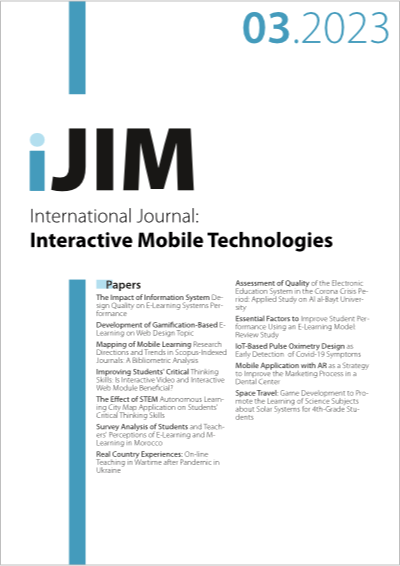Real Country Experiences: On-line Teaching in Wartime after Pandemic in Ukraine
DOI:
https://doi.org/10.3991/ijim.v17i03.36419Keywords:
E-learning, on-line, University student, teaching EnglishAbstract
The manuscript points on the new challenges in higher education in terms of wartime in Ukraine after the world pandemic. The real country experience in English on-line teaching and learning is defined as it was important during the lockdown and it is suitable now in wartime in Ukraine. The aim of the research is to show helpful ideas, experience, to stress the advantages for English on-line teaching and learning. Some general theoretical methods as analysis and synthesis, and the empirical one as questionnaires discovered the advantages of the issue under study. The research has pointed out to the results: on-line teaching and learning prove the development of all the English language skills; off-line teaching and learning are basically useful for the students with high motivation. The Moodle platform (version 3.7), the University platform “Educational Electronic Information Complex” (EEIC), Zoom, Meet, Skype, Microsoft Teams are used for on-line teaching and learning. The most common advantages are the prospect to watch learning material on a laptop or mobile phone screen, to start any type the recordings as audio as video in the best quality. The conclusion is it is necessary to find a balance between on-line and off-line learning, communication, and interaction.
Downloads
Published
How to Cite
Issue
Section
License
Copyright (c) 2023 Ilona Kostikova, Liudmyla Holubnycha, Oleksandra Marmaza, Viktoriia Budianska, Olha Pochuieva, Halyna Marykivska

This work is licensed under a Creative Commons Attribution 4.0 International License.



